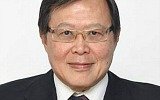Henry Ho: «We’re Not Here to Make Your Next $50 Million»
The wealth management arm of Rothschild based in London and Switzerland, aims to expand in Southeast Asia and strongly relies on personal networks, such as the ones built by Henry Ho, to make it happen.
 Sitting in an office provided by Rothschild in Singapore, Henry Ho reminisces about his long career in banking, which spans several financial crises and even terror attacks, in an exclusive interview with finews.asia.
Sitting in an office provided by Rothschild in Singapore, Henry Ho reminisces about his long career in banking, which spans several financial crises and even terror attacks, in an exclusive interview with finews.asia.
Ho (pictured above), a 62-year-old citizen of Malaysia, has only just arrived from Kuala Lumpur, where he lives. Since taking on the role of a non-executive board member at the venerable Rothschild imperium, he’s been in the city-state more frequently again and also across the whole of Southeast Asia.
Rothschild in the 1980s had a very successful investment-banking business in Asia, but the bank took a step back in the following decade. A few months ago, Rothschild Bank embarked on a relaunch, with Henry Ho assuming a prominent role, not least in wealth management for very rich customers. It is a segment that the bank is putting emphasis on, alongside investment banking.
First-class Personal Network
For the latter, the bank requires the necessary know-how and, what’s more, a first-class personal network; something that Ho can contribute with thanks to his background.
The Malaysian actually wanted to retire after a long career spent in banking. But when the call of the most noble of banking dynasties reached him, he couldn’t refuse. Rothschild had plenty of reasons to hire Henry Ho. He has been one of the most experienced bankers in Asia since the 1980s.
Escaping a Terrorist Attack
In the 1970s, he studied engineering and briefly worked in that industry. But a short while later, he moved to Canada to further his studies and quickly realized how important the emerging finance industry was. Back in Malaysia, in 1981, he was hired by Citibank. That was the basis for his 35-year-career in banking, which took him to Thailand, Indonesia, Singapore and Saudi Arabia, where, in 2002, he escaped a terrorist attack through sheer luck. It prompted him to leave the country a short while later.
As head of Citibank in Thailand he became a witness of the Asian crisis of 1997 – something he readily admits caused him many sleepless nights. The bank was well prepared for difficult times but the business at times collapsed, he remembers. But even in times such as those, decisions have to be taken, knowing, that in business things will even out again. Or, as he says, «what goes up, comes down again and vice-versa» – in keeping with the Zen-like attitude he’s known for in the industry.
First-hand Witness
It may have been exactly what Temasek, the Singapore state fund, took note of. Not long after leaving Saudi Arabia, he received the offer to manage Bank Internasional Indonesia (BII), a company in which Temasek held a stake.
In 2009, Ho returned to Singapore, where he became first-hand witness to the global financial crisis, which had erupted a year earlier. Due to the circumstances, the plan to merge Singapore’s DBS Bank with Indonesia’s Bank Danamon failed. Temasek still holds a stake in DBS. There were too many political concerns for the transaction to become a success.
Several Mandates
Ho then became managing director at Temasek. He identified a string of companies struggling because of the financial crisis. Temasek invested in those companies, mostly with great success as it turned out. He also assumed several mandates as a consultant, for instance at Singapore’s Fullerton Financial Holdings and Temasek International. He also became a board member at PT Chandra Asri in Indonesia, AIA in Singapore and Alliance Bank of Malaysia.
The rest is history. When Ho in 2015 decided to retire, Rothschild Bank approached him with the plan to expand their business in Southeast Asia. He particularly liked the bank’s approach, aimed at the preservation of assets.
In the Segment of the Very Rich
«We’re not here to make your next $50 million but to preserve your $50 million over time,» Ho said. He sees huge business opportunities for Rothschild Wealth Management in the increasing transfer of assets from the founder generation to the next.
Rothschild doesn’t have its own booking platform in Asia, but forwards the money to either London or Switzerland. This is a welcome diversification for many Asians, especially in the segment of the very rich (averaging at $25 million) that Rothschild’s wealth management business caters for.
This Year Will Be Better
The bank doesn’t simply want to sell financial products to customers, but offers a comprehensive wealth planning service, including trust and custody services, Ho emphasized in the interview. He sees enormous growth potential in the constantly increasing prosperity apparent in China, but also in countries such as Indonesia, Vietnam and Malaysia. Singapore will remain ideally placed as a hub, even if growth recently has slowed in the region.
«But this year already will be better than 2016,» Ho said. «Many people are too pessimistic following the experiences of last year with Brexit, the stock exchange wobbles in China and the election of Donald Trump.» China already had addressed a great number of its problems, India’s reforms were taking hold, the oil price had bottomed out and emerging markets in Asia got back in favor with investors, Ho said – again very much in line with his Zen-like balancing attitude.
Now is therefore the time to meet your clients, he added. He flies to Singapore from Kuala Lumpur every second week to fulfill his obligations to Rothschild.




























